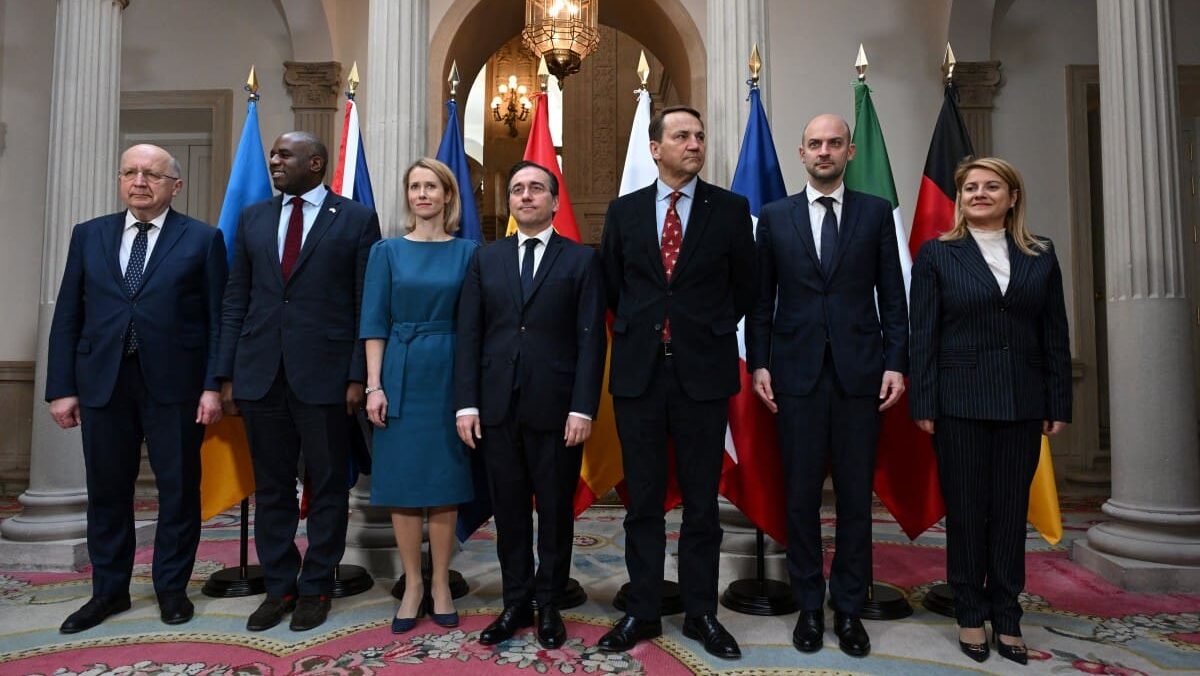
(From L) EU Commissioner for Defence and Space Andrius Kubilius, Britain’s Foreign Secretary David Lammy, High Representative of the European Union for Foreign Affairs and Security Policy Kaja Kallas, Spain’s Foreign Minister Jose Manuel Albares, Poland’s Foreign Minister Radoslaw Sikorski, France’s Foreign Minister Jean-Noel Barrot and Italy’s Undersecretary of State for Foreign Affairs Maria Tripodi pose for a official picture prior a meeting with members of the G5+ Foreign Ministers and Ukraine’s Foreign Minister in Madrid on March 31, 2025.
Photo: JAVIER SORIANO / AFP
The fourth meeting of the G5+ group, held on March 31st at the Spanish Foreign Ministry headquarters, was once again an exercise in grandiose rhetoric with few concrete results. Spain, Germany, France, Poland, Italy, and the UK, along with EU High Representative for Foreign Affairs Kaja Kallas signed a joint declaration reaffirming their commitment to “take greater responsibility” for European security and pressure Russia to cease its aggression against Ukraine. However, firm commitments were conspicuously absent behind the lofty words, and the fear of taking decisive action seems to continue paralyzing European leaders.
“We call on Russia to end its delaying tactics and agree without delay to an immediate and unconditional ceasefire,” read the G5+ communiqué. The foreign ministers present insisted that Ukraine has shown “a firm commitment to peace,” while Moscow continues to show no signs of relenting. Yet, beyond this warning and the threat of “new sanctions,” the meeting failed to produce concrete measures that would demonstrate a genuine willingness to escalate pressure on the Kremlin. “We are ready to exert more pressure on Russia using all available instruments,” the signatories declared. Still, the vagueness of the statement hints at a lack of consensus on how to proceed.
One of the most evident signs of this reluctance is the handling of frozen Russian assets, an issue Spanish Foreign Minister José Manuel Albares had raised as a potential tool for financing Ukraine. However, the communiqué merely reiterates that “Russia’s assets must remain withheld until Russia ends its war of aggression and compensates for the damage caused.” European caution starkly contrasts the statements made by Finnish President Alexander Stubb, who called on Donald Trump to set April 20th as the deadline for a ceasefire—a proposal the G5+ supported without committing to lead.
Building on recent summits in Paris and London, the meeting also allowed the six countries and Kallas to underline their “strong commitment to NATO” and their intention to achieve “a meaningful outcome” at the summit in The Hague in June. “Europe must be better equipped to act autonomously in the face of immediate and future challenges,” they argued. But these words, which sound like a challenge, clash with reality: the continent continues to provide nearly two-thirds of Ukraine’s support, but no one seems willing to make the qualitative leap required to change the course of the conflict.
France’s Jean-Noël Barrot, Poland’s Radosław Sikorski, and Britain’s David Lammy attended the meeting, while Germany’s Annalena Baerbock and Ukraine’s Sergiy Kyslytsya spoke via videoconference. All agreed on the need for “real security guarantees” for Ukraine and support for initiatives such as a Special Court for the Crime of Aggression. Ultimately, the G5+ leaves Madrid with a message that is clear in form—’we will fight Russia’—but vague in substance. Empty words resonate in a context where the war in Ukraine continues to rage and the EU, despite its rhetoric, seems more comfortable at the rear than on the front line.
